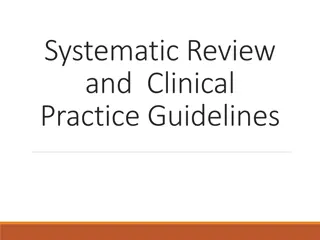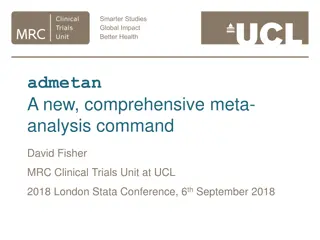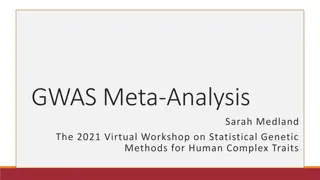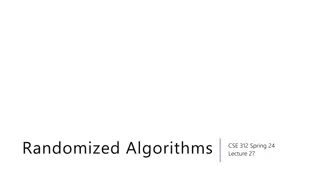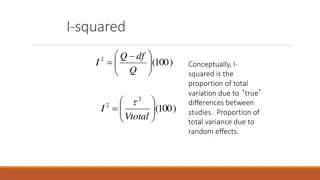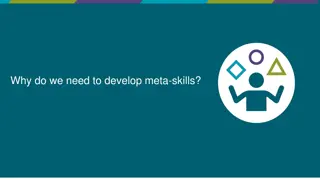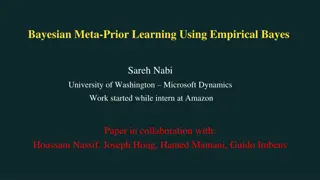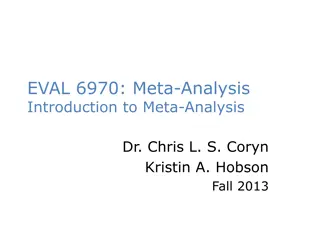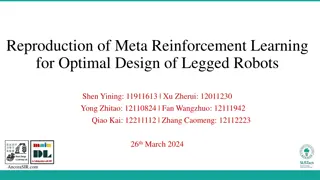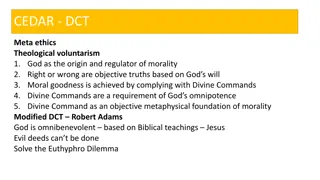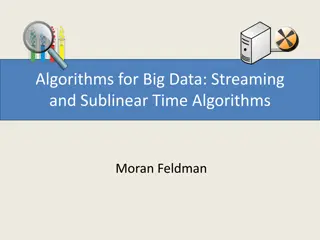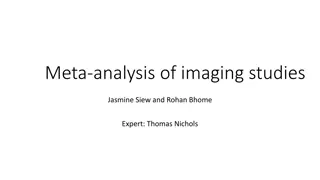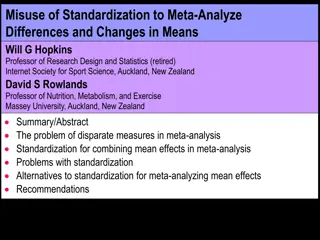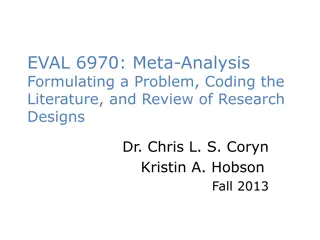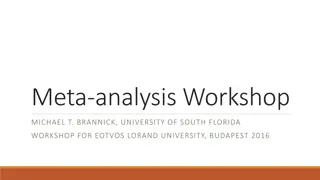Introduction to Meta-analysis in Stata
This workshop, presented by Dr. Christine R. Wells from UCLA, provides an in-depth exploration of meta-analysis in Stata. Participants will learn about systematic reviews, data collection and organization, running meta-analyses, interpreting results, creating graphs, and identifying biases. The focu
6 views • 181 slides
Systematic Reviews, Meta-analysis, and Clinical Practice Guidelines
Explore the importance of systematic reviews, critical appraisal questions, meta-analysis, and clinical practice guidelines in the healthcare field. Learn about the process of appraising systematic reviews, the significance of meta-analysis, and the benefits of following clinical practice guidelines
5 views • 16 slides
Near-Optimal Quantum Algorithms for String Problems - Summary and Insights
Near-Optimal Quantum Algorithms for String Problems by Ce Jin and Shyan Akmal presents groundbreaking research on string problem solutions using quantum algorithms. The study delves into various key topics such as Combinatorial Pattern Matching, Basic String Problems, Quantum Black-box Model, and mo
4 views • 25 slides
Comprehensive Overview of Admetan: A New Meta-Analysis Command
This meta-analysis command, Admetan, introduced by David Fisher from MRC Clinical Trials Unit at UCL, offers a comprehensive analysis of combining results from independent studies. It builds on the history of meta-analysis in Stata and aims to enhance capabilities for researchers. Admetan provides f
3 views • 19 slides
Meta-Analysis in GWAS: Methods and Applications
Meta-analysis in GWAS involves combining data across studies to estimate overall effects, explore cohort differences, improve power, and replicate findings. It includes joint vs. meta-analysis, methods, and types such as fixed effect and random effect meta-analyses.
16 views • 20 slides
Combining Graph Algorithms with Data Structures and Algorithms in CSE 373 by Kasey Champion
In this lecture, Kasey Champion covers a wide range of topics including graph algorithms, data structures, coding projects, and important midterm topics for CSE 373. The lecture emphasizes understanding ADTs, data structures, asymptotic analysis, sorting algorithms, memory management, P vs. NP, heap
4 views • 38 slides
Randomized Algorithms: A Deep Dive into Las Vegas and Monte Carlo Algorithms
Randomized algorithms incorporate randomness into computations, with Las Vegas algorithms always providing the correct answer but varying in time, while Monte Carlo algorithms occasionally give wrong answers. Quick Sort is a classic Las Vegas algorithm that involves pivoting elements for sorting. Ch
7 views • 21 slides
Meta's Role in Amplifying Anti-Rohingya Hate on Facebook
The investigation findings reveal Meta's failure to address hate speech and incitement against the Rohingya people on Facebook, resulting in a platform that amplified and promoted harmful content. Despite admitting in 2018 that more needed to be done, Meta's business model of data collection and eng
5 views • 7 slides
Distributed Algorithms for Leader Election in Anonymous Systems
Distributed algorithms play a crucial role in leader election within anonymous systems where nodes lack unique identifiers. The content discusses the challenges and impossibility results of deterministic leader election in such systems. It explains synchronous and asynchronous distributed algorithms
21 views • 11 slides
Mathematical Analysis of Algorithms in CMPE371 - Fall 2023-2024
Explore the mathematical analysis of algorithms in CMPE371 for Fall 2023-2024, focusing on non-recursive and recursive algorithms. Learn how to analyze non-recursive algorithms by deciding on input size parameters, identifying basic operations, and simplifying summations. Dive into recursive algorit
3 views • 31 slides
Meta-programming in Haskell: A Closer Look at Splices and Quotations
Explore the world of meta-programming in Haskell through splices and quotations. Learn about successful extensions introduced by Simon Peyton Jones and Tim Sheard, including practical examples like generating source code using splices that are type-checked and compiled at compile time. Dive into con
9 views • 45 slides
Prediction and Confidence Intervals in Meta-Analysis
Conceptually, I-squared represents the proportion of total variation due to true differences between studies, while Proportion of total variance is due to random effects. Prediction intervals provide a range where study outcomes are expected, unlike confidence intervals which contain the parameter's
5 views • 26 slides
Exploring the Role of Algorithms in Game Design
Delve into the world of algorithms in game design, from understanding the fundamental concept of algorithms to their pervasive presence in various aspects of gaming, such as military simulations, medical simulations, and gameplay mechanics. Explore how algorithms shape experiences in different types
28 views • 10 slides
Future Role of State Governance through Meta-Governance and Political Leadership
Governance research perspective discusses the evolving role of the state in mobilizing public and private actors through interactive forms of governance. Meta-governance theory emphasizes the governance of governance, with a focus on interactive governance arenas. Recent theories of political leader
9 views • 11 slides
Contexts: A Meta-Ontological Approach
Ontologies provide a general representation of reality, but knowledge is mostly context-dependent. Analyzing different types of contexts, from linguistic to manufacturing, remains a challenge. This study aims to deepen the understanding of the ontological nature of contexts by leveraging a meta-onto
2 views • 14 slides
Developing Essential Meta-Skills for Personal Growth
Enhancing meta-skills such as focusing, initiative, integrity, adapting, collaborating, leading, communicating, and feeling is crucial for personal development. These skills enable individuals to maintain concentration, make confident decisions, uphold ethical values, embrace change, build relations
0 views • 14 slides
Bayesian Meta-Prior Learning Using Empirical Bayes: A Framework for Sequential Decision Making Under Uncertainty
Explore the innovative framework proposed by Sareh Nabi at the University of Washington for Bayesian meta-prior learning using empirical Bayes. The framework aims to optimize ad layout and classification problems efficiently by decoupling learning rates of model parameters. Learn about the Multi-Arm
4 views • 27 slides
EVAL 6970: Meta-Analysis
Dive into the Fall 2013 introduction to meta-analysis course led by Dr. Chris L. S. Coryn and Kristin A. Hobson. Explore topics such as course agenda, required textbooks, software requirements, homework assignments, final project details, weighting of components, instructional format, and course web
4 views • 30 slides
Reproduction of Meta Reinforcement Learning for Optimal Design of Legged Robots
Our project aims to reproduce the Meta Reinforcement Learning process for optimal design of legged robots, focusing on understanding robot design parameters, algorithms, and optimization. We will explore Markov Decision Process (MDP), Model-Agnostic Meta-Learning (MAML), and design optimization tech
3 views • 9 slides
Meta-Ethics: God's Role in Moral Truths and Ethical Foundations
Meta-ethics delves into the nature of ethical statements, exploring the concept of morality originating from God, objective truths based on Divine Commands, and the dichotomy of cognitive and non-cognitive ethical perspectives. It discusses theological voluntarism, the Euthyphro Dilemma, and various
1 views • 27 slides
Meta-Regression and Complex Data Structures Overview
From exploring meta-regression to understanding complex data structures, this course delves into estimating the impact of covariates on effect sizes. Dive into fixed and random-effects models, ANOVA tables, and fit tests, enhancing your knowledge of meta-analysis and covariate influence.
3 views • 26 slides
Effectiveness of ACT: Meta-Analysis Results
Evidence supports the efficacy of Acceptance and Commitment Therapy (ACT) based on results from a meta-analysis on clinical applications. The meta-analysis covers various studies, including earlier analyses by Hayes et al., Ost, Powers, Veehof et al., and Ruiz. It delves into criteria for inclusion,
2 views • 32 slides
Algorithms for Big Data: Streaming and Sublinear Time Algorithms
Motivation behind big data research, exploration of sublinear time algorithms, and analysis of algorithms for diameter approximation and property testing. The talk delves into theoretical algorithms for big data problems, focusing on streaming and sublinear time algorithms, showcasing classical exam
4 views • 30 slides
Meta-analysis of Imaging Studies: Important Steps and Limitations
This meta-analysis delves into the significance of imaging studies, addressing the need for informed decisions, replication, and the challenges posed by underpowered analyses and prevailing experimental procedures. It explores the research question, inclusion/exclusion criteria, group effects, and t
5 views • 34 slides
Misuse of Standardization in Meta-Analysis
In meta-analysis, standardization plays a crucial role in combining mean effects from different studies. However, using standardization improperly can lead to biased results and misinterpretations. This article delves into the problems with standardization, alternatives for meta-analyzing mean effec
3 views • 21 slides
Meta-Analysis in Research: Problem Formulation and Literature Coding
In a Fall 2013 course, Dr. Chris L. S. Coryn and Kristin A. Hobson discussed the critical aspects of meta-analysis, emphasizing the importance of formulating a precise problem statement and effectively coding the literature. They explored research designs and outlined steps for conducting meta-analy
3 views • 44 slides
Meta-Analysis: Overview, Steps, and Common Effect Sizes
Explore the comprehensive world of meta-analysis with insights into its definition, steps involved, and common effect sizes utilized. Dive into coding, computation, and conversion processes essential for conducting a successful meta-analysis.
1 views • 21 slides
Meta-analysis Workshop by Michael T. Brannick - University of South Florida 2016
Explore the meta-analysis workshop conducted by Michael T. Brannick at the University of South Florida in 2016. The workshop covers datasets, open software, steps in meta-analysis, research questions, pros and cons of meta-analysis, and focuses on the research question related to exercise as a treat
2 views • 49 slides
Disparate Measures in Meta-Analysis: Standardization Challenges
Explore the challenges of combining mean effects in meta-analysis due to disparate measures. Learn about the misuse of standardization, alternatives, and recommendations for better analysis methods. Discover the importance of utilizing appropriate standard deviations and different approaches for acc
1 views • 21 slides
Meta Learning vs. Self-supervised Learning in AI
Explore the distinctions between Meta Learning and Self-supervised Learning through insights from Hung-yi Lee. Dive into topics like initialization parameters, leveraging training tasks, and achieving performance on various tasks. Discover how BERT and MAML play crucial roles in these learning parad
4 views • 32 slides
Meta-Analysis in GWAS: Methods and Applications
Explore the world of Meta-Analysis in Genome-Wide Association Studies (GWAS) through topics like combining data across studies, joint vs. meta-analysis, and types of meta-analysis. Dive deep into fixed and random effect models, how meta-analysis is used in GWAS, and its significance in estimating ov
4 views • 23 slides
Files and Meta-level Information in Computing
Dive into the world of files, bytes, and meta-level information in computing. Learn about the diverse types of files, their representation, and how permissions impact file access. Discover tools like chmod for changing file permissions and gain insights into meta-level data associated with files.
1 views • 25 slides
Meta-Analysis in Research
Discover the essential concepts of meta-analysis in educational research, including its relationship with systematic reviews, examples of questions addressed, and interpretations of results. Learn about the systematic review process, the different types of research synthesis methods, and the key ste
3 views • 30 slides
Understanding Meta-Causation in Consciousness by John Barnden
Explore the intriguing concept of meta-causation in consciousness as presented by John Barnden, an Emeritus Professor of AI. Delve into the argument that meta-causation is a necessary condition for pre-reflective auto-sensitivity in consciousness, backed by a radical and novel claim. Gain insights i
2 views • 30 slides
Enhancing Generalization in Meta-learning via Task Augmentation
Explore methods to improve generalization in meta-learning through task augmentation, addressing meta-overfitting and memorization issues. Solutions include involving more data, combining support and query sets, label shifting, and designing effective augmentation strategies such as MetaMix.
0 views • 10 slides
Conducting Meta-analysis in R with Metafor: Data Uploading and Analysis Guide
Learn how to conduct meta-analysis in R using the Metafor package. Discover how to upload datasets, create variables, compute effect sizes, and analyze data for a meta-analysis. Examples and instructions are provided for reading Excel files, utilizing built-in datasets, and exploring different moder
0 views • 6 slides
Understanding Data Modeling and Meta Models
Dive into the world of data modeling and meta models, exploring concepts such as three layers of meta model, domain-specific ontology, and instance models. Learn about the comparison between different meta models and their implementations in Excel, JSON Schema, and RDF/SHACL.
1 views • 41 slides
Understanding Meta-Causation in Consciousness Theories
Explore the concept of meta-causation in consciousness theories as discussed by John Barnden, delving into the crucial role it plays in understanding consciousness and the causative connections within trajectories. Discover the implications of meta-causation on machine consciousness, melding cogniti
3 views • 30 slides
Understanding Meta-Causation in Conscious Processes
Explore John Barnden's perspective on meta-causation in conscious processes and its implications for a novel physicalist theory of consciousness. Dive into the concept of meta-dynamics and higher-order causation as essential elements in understanding the nature of consciousness at a fundamental leve
2 views • 33 slides
Rare Variant Meta-Analysis Insights
Explore the power and techniques of rare variant meta-analysis to enhance association test results, leveraging gene-based tests and increasing sample size to identify functional rare variants. Discover tools like RAREMETAL for comprehensive meta-analysis in genetics research.
1 views • 23 slides

